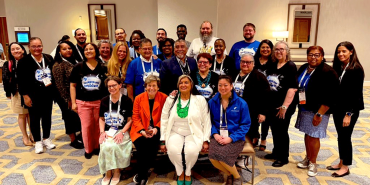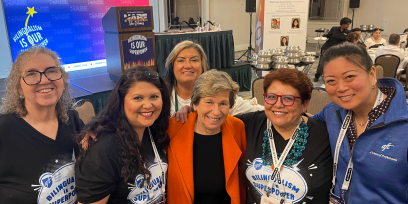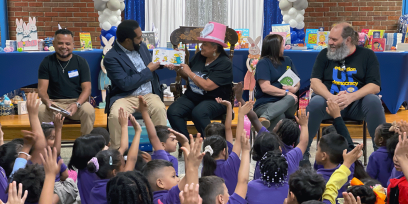Scores of AFT leaders and members flocked to New Orleans March 28-30 for the National Association for Bilingual Education’s 53rd International Bilingual Education Conference, where our union ran no fewer than 18 workshops, headlined several featured sessions, offered a full day of parent engagement sessions and celebrated literacy with elementary school book giveaways that included author appearances and readings.
From an expo booth packed full of AFT resources and information about free teaching and learning tools for bilingual leaners from Colorín Colorado to AFT President Randi Weingarten’s remarks at the NABE awards luncheon and of course AFT Executive Vice President Evelyn DeJesus’ leading role as president of NABE, the AFT maintained a robust presence supporting participants as they renewed their commitment to building a community of thriving multilingual learners and educators.
Guest after guest—including U.S. Secretary of Education Miguel Cardona, himself an English language learner—repeated the guiding principle of the conference, and of the work this group of dedicated educators and policymakers does every day: “Bilingualism is a superpower,” he declared, and the crowd roared its approval. When it comes to bilingual and multilingual students, “Their diversity is our strength,” DeJesus said, expanding on the theme. “The backgrounds they bring with them enrich their education and our schools and communities.”
“This country is the land of immigrants,” said Weingarten. “Immigration has been our strength.”
But that strength takes work. “These children and their families need teachers, resources and schools that understand the cultural and linguistic superpowers they bring to the table, as well as their educational, emotional and material needs,” said DeJesus.
And schools need more bilingual and English as a second language (ESL) teachers, she added later. That’s why the AFT and NABE are working hand in hand to push for federal resources that will support “grow your own” programs to train teachers who already belong to the bilingual community, she said. NABE’s signature Bilingual Education Student Organization program was highlighted as an especially effective tool addressing the chronic ESL and bilingual teacher shortage.
A handful of the sessions were led by the AFT’s ELL Cadre, a group of national trainers and practitioners in the field. Speakers touted culturally responsive pedagogy, the importance of honoring language and culture, securing federal resources to boost ELL programs and teacher development, meeting the mental health and wellness needs unique to ELLs, and using labor-management partnerships to address these many issues collaboratively.
In a standing-room-only discussion about the importance of heritage and language in education, DeJesus reminded everyone that culturally responsive pedagogy (CRP) must go beyond celebrating cultural holidays, arts, heroes and food; it must create awareness around different cultures, language and power relationships and address discrimination, misconceptions and racism. That’s something that educator, author and conference participant Elizabeth Santiago could relate to since it served as the foundation for her book, The Moonlit Vine, the first contemporary young adult novel to explore the culture of the Taíno people native to Puerto Rico.
Workshop highlights
Four AFT leaders led a workshop on how partnerships among families, educators and students can address the needs of multilingual students: They were Jessica Tang, president of the Boston Teachers Union and co-chair of the AFT Asian American and Pacific Islander Task Force; Nancy Vera, president of Corpus Christi AFT; Lilia Carreon, president of El Rancho Federation of Teachers; and Juan Ramirez, executive vice president of the California Federation of Teachers and co-chair of the AFT Latino Issues Task Force. Tang and Kent Wong, a member of the AFT AAPI Task Force, led another workshop on Advancing Asian American Studies in Response to Anti-Asian Hate. Mary Cathryn Ricker, executive director of the AFT-affiliated Albert Shanker Institute, examined data showing how reading reform programs sometimes neglect language learners, and how educators must guard against that.
Other speakers included Montserrat Garibay, a former AFT leader who is now assistant deputy secretary and director of the U.S. Department of Education’s Office of Language Acquisition, motivational speaker and author Juana Bordas of Mestiza Leadership International, and children’s authors and bilingual and multicultural education advocates Alma Flor Ada and F. Isabel Campoy. Dr. Rebecca Palacios, early childhood expert, AFT member and author of Being Your Child’s Most Important Teacher: A Guide for Families with Young Children, keynoted the educator and parent institute highlighting practical tips for parents.
Additional workshops covered an array of topics, including retaining teachers in hostile environments—where increased workloads and overemphasis on standardized testing compound political challenges and rising mental health needs among students. Another described how to use trauma-informed approaches for newcomers who may struggle not just with language but also with traumatic experiences before or during their immigration.
On-the-ground practicality
Workshops about parent engagement covered how to ensure families understand how to get an IEP for their children, tips for accessing resources for newcomers, and how best to include and engage parents when language or culture seems to be a barrier.
Reaching out to children with multilingual books they can bring home to their families is another great way to engage and include everyone in the school community, and that is what the AFT did just outside the conference halls. Teaming up with the Jefferson Federation of Teachers, United Teachers of New Orleans and First Book, the AFT hosted Reading Opens the World book giveaways at elementary schools near the conference: We gave away more than 1,500 bilingual books—in Spanish/English, Haitian Creole/English, French/English and Mandarin/English—as well as 100 backpacks and school supplies. On hand helping with books and other activities were local AFT leaders, including Louisiana Federation of Teachers President Larry Carter, JFT President Sandra Hauer, JFT Executive Vice President Bonnetta Franklin and UTNO President Dave Cash.
Wrapping up the energy of the conference, DeJesus left participants with two calls for action: First, she challenged them to keep “raising the bar for multilingual learners” and making sure that bilingual education is at the center of the national conversation about education. And second, she said, it is so important “that we respond with all our hearts and all our commitment and all our expertise to the call to welcome, to love and to teach these most vulnerable newcomer children.”
[Virginia Myers]



